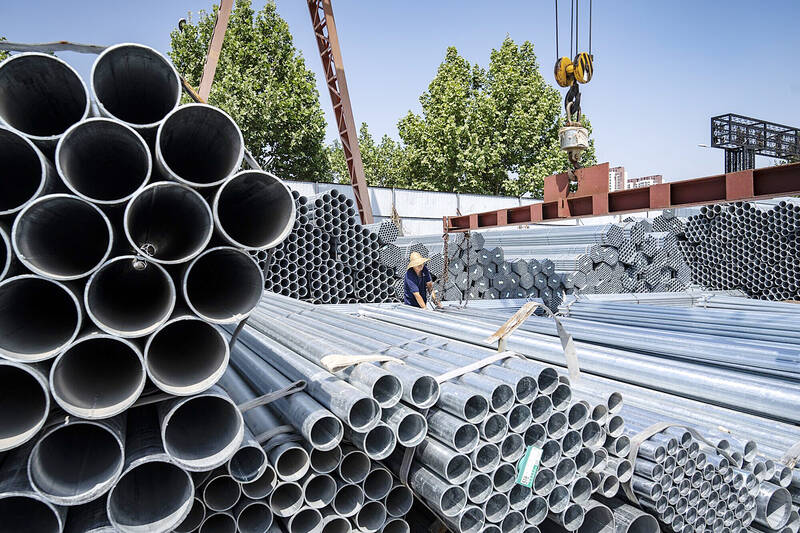China Steel Corp (CSC, 中鋼), the nation’s largest steelmaker, yesterday announced that it would cut steel quotation prices for domestic deliveries next month — its first price cut across the board since August last year — as the global steel market grapples with China’s excessive exports of low-priced products.
The move also reflects weak sentiment in the market dented by factors such as extreme weather, financial market turmoil and the off-season effect in summer, the Kaohsiung-based company said in a statement.
While the prices of iron ore have recently dropped to US$100 per tonne and those of coking coal have fallen to between US$210 and US$220 per tonne to help cut steelmaking cost, they are still at relatively high on a long term basis, it said.

Photo: Bloomberg
As a result, the company said it would lower the price of benchmark hot-rolled steel plates and coils by NT$600 per tonne and cold-rolled steel plates and coils by NT$500 per tonne.
The company would also decrease the price of anti-fingerprint electro-galvanized steel coils, used for construction, hot-dipped galvanized steel coils, used for home appliances, computers and other materials, and electrical steel coils by NT$500 per tonne each, it said.
“We will moderately lower prices in September to help domestic downstream customers secure orders and lessen the impact of low-priced steel imports,” China Steel said in the statement.
The company said the oversupply situation in China has continued to worsen, leading to a large number of low-priced products being exported.
ArcelorMittal SA, the world's second-largest steel producer, earlier this month said China’s aggressive exports were creating problems for the global steel industry, while China Baowu Steel Group Corp (寶武鋼鐵集), the world's largest, this week warned of a severe industry crisis as steel prices collapse.
In the first seven months of this year, exports of steel from China increased 21.8 percent year-on-year to 61.23 million tonnes, while average export prices decreased 24.8 percent from a year earlier, both adding pressure on the global steel market, China Steel said, citing data compiled by the Beijing-based China Iron and Steel Association.
Countries including Vietnam, Thailand and Turkey have recently responded with trade measures, including anti-dumping complaints against China’s hot-rolled steel products, the company said, adding that it would also apply for trade remedy measures in Taiwan to curb the arrivals of low-priced steel products from China.
On Tuesday, the company reported its net profit in the first half of the year surged 635.58 percent year-on-year to NT$1.96 billion (US$60.7 million).
Earnings per share rose to NT$0.13 from NT$0.02 in the same period a year earlier.
Consolidated revenue in the first seven months grew 1.2 percent annually to NT$217.6 billion, the company said in a regulatory filing.

The US dollar was trading at NT$29.7 at 10am today on the Taipei Foreign Exchange, as the New Taiwan dollar gained NT$1.364 from the previous close last week. The NT dollar continued to rise today, after surging 3.07 percent on Friday. After opening at NT$30.91, the NT dollar gained more than NT$1 in just 15 minutes, briefly passing the NT$30 mark. Before the US Department of the Treasury's semi-annual currency report came out, expectations that the NT dollar would keep rising were already building. The NT dollar on Friday closed at NT$31.064, up by NT$0.953 — a 3.07 percent single-day gain. Today,

‘SHORT TERM’: The local currency would likely remain strong in the near term, driven by anticipated US trade pressure, capital inflows and expectations of a US Fed rate cut The US dollar is expected to fall below NT$30 in the near term, as traders anticipate increased pressure from Washington for Taiwan to allow the New Taiwan dollar to appreciate, Cathay United Bank (國泰世華銀行) chief economist Lin Chi-chao (林啟超) said. Following a sharp drop in the greenback against the NT dollar on Friday, Lin told the Central News Agency that the local currency is likely to remain strong in the short term, driven in part by market psychology surrounding anticipated US policy pressure. On Friday, the US dollar fell NT$0.953, or 3.07 percent, closing at NT$31.064 — its lowest level since Jan.

The New Taiwan dollar and Taiwanese stocks surged on signs that trade tensions between the world’s top two economies might start easing and as US tech earnings boosted the outlook of the nation’s semiconductor exports. The NT dollar strengthened as much as 3.8 percent versus the US dollar to 30.815, the biggest intraday gain since January 2011, closing at NT$31.064. The benchmark TAIEX jumped 2.73 percent to outperform the region’s equity gauges. Outlook for global trade improved after China said it is assessing possible trade talks with the US, providing a boost for the nation’s currency and shares. As the NT dollar

The Financial Supervisory Commission (FSC) yesterday met with some of the nation’s largest insurance companies as a skyrocketing New Taiwan dollar piles pressure on their hundreds of billions of dollars in US bond investments. The commission has asked some life insurance firms, among the biggest Asian holders of US debt, to discuss how the rapidly strengthening NT dollar has impacted their operations, people familiar with the matter said. The meeting took place as the NT dollar jumped as much as 5 percent yesterday, its biggest intraday gain in more than three decades. The local currency surged as exporters rushed to